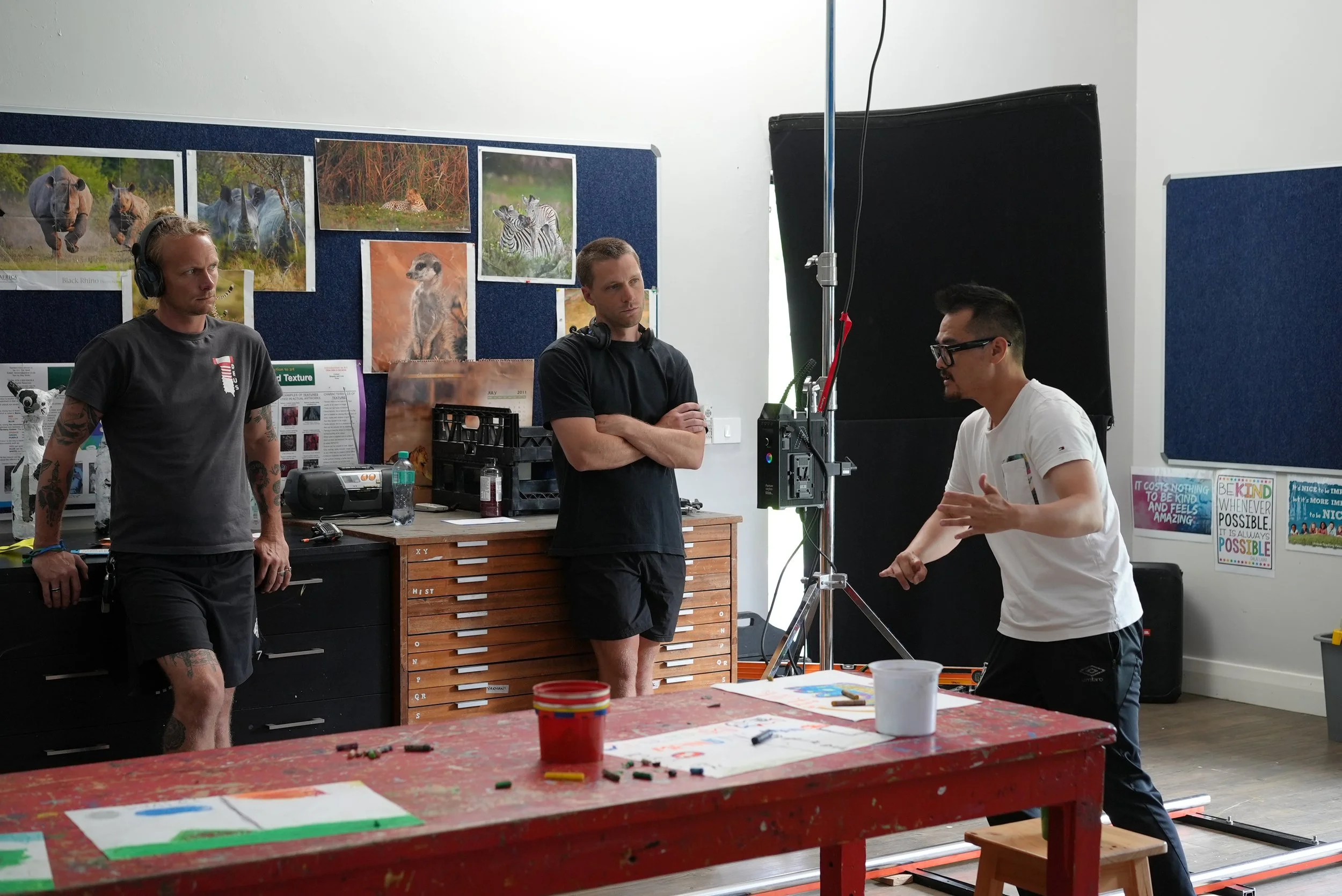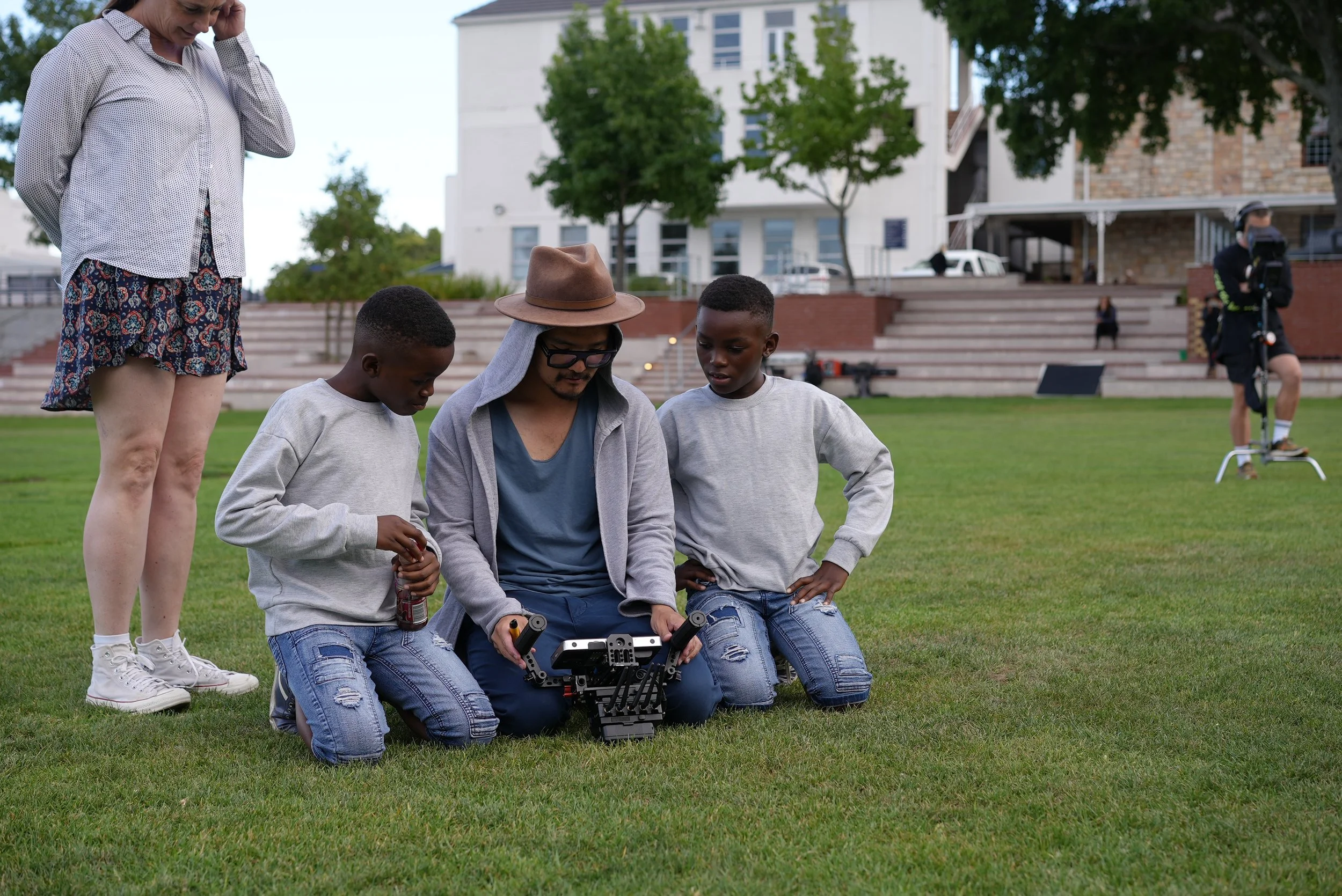An exploration of art and trauma through Bill Chen’s CHICKEN
By Owentando Zantsi
Over the years I have consumed my fair share of Short films. From award-winning productions with semi-famous casts to student films shot on a single phone camera with the worst sound you can imagine - and everything in between. What draws me towards this style of cinema is the fact that so much can be said in the span of as little as 2 minutes or 30.
The medium condenses its messages in some of the most creative ways, bringing a unique avenue of expression and storytelling in media. Recently I had the pleasure of watching Chicken, the closing film from the Behind Her Lens movie festival, and it is a prime example of how powerful short films can be.
The film features brothers Peter and Paul (played by real life brothers Peter and Paul Mapfumo), as the two main characters. It follows their day-to-day lives at school, at home, and with family friends. On the surface it seems like a cosy slice-of-life story but its darker, more uncomfortable premise is gradually revealed as the narrative unfolds.
The core focus of the film is child on child sexual assault and how trauma and grief shape our behaviour and relationships. One standout aspect of Chicken is that it tackles abuse in a way where nothing is ever explicitly said or shown.
The relationship the boys have with each other and the world around them is alluded to and hinted at with the music, camera angles and the behaviour of the actors themselves with minimal dialogue or exposition.
I find this especially intriguing as it forces the viewer to think critically about what happens. It compels one to take into account every tiny detail, from what is shown and what isn't, and how it plays into the deeper meaning.
A word deliberately muffled by an ominous burst of music, or a lingering glance between brothers - even a still frame of the sky above packs a punch. These artistic choices paint a picture that allows the viewer to feel the weight of what is happening while respecting the sensitive nature of this type of trauma, particularly in children.
This is not to say the dialogue itself plays no role. In fact its role is all the more significant because it is so minimal. Every word used feels carefully hand-picked, creating parallels to the innuendos in the cinematography. They complete each other making a film that is both important and powerful.
Recently, we had the pleasure of sitting down with the director of the film, Bill Chen. An emerging filmmaking voice to watch out for and graduate from New York University’s Tisch School of the Arts with a BA in Film and TV production, his broad filmography has been featured in many film festivals with Chicken already screened in the UK at the BIFA-qualifying Exit 6 Film Festival (British Independant Film Awards) and in New York at Bushwick Film Festival (considered the largest film festival in New York City).
I caught up with him ahead of the festival this Saturday to find out more about the film, its creation and what went into putting something like this together - both practically and emotionally.
What inspired the creation of chicken?
Bill was open when it came to the inspirations behind Chicken, telling us the story is actually his own, and based on his lived experiences. When it came to the film he elaborated about how he had thought about it for a while but was apprehensive about making a film relating to his own experiences.
“I was apprehensive because I felt like autobiographical material can sometimes be a little pretentious, or I felt that making a film about my own life might be a little self-indulgent.”
After he got robbed in 2019, when he was in lockdown in 2020 the recent trauma of the robbery brought to light the traumatic memories of his childhood which had been repressed for some time, and he set about writing the script for the film.
“Once I had written the script, I felt I could be objective about its value as a story, as a message, and as a film.”
From our conversation, it became clear that telling the story wasn't a choice, but something he couldn't ignore any longer. And writing and directing Chicken became his way of processing what happened using a creative output.
There was very little dialogue, with most things being hinted at with innuendos. What drove you to choose this style of film?
Bill shared that there was a practical and technical element to this decision. Telling us how it was easier for the children to have to memorise as few lines as possible, more than that, he put an emphasis on using naturalistic actors. This decision was influenced by his desire to keep the film as authentic as possible, in order to preserve the raw, vulnerable nature of the topic.
“When making a film you ideally want to tell your story with as little dialogue as possible - film is a visual medium so for me, stripping it of any unnecessary dialogue is always the goal.”
Which would you say is the better medium - short film vs feature? In terms of production and as an art form?
“They’re actually fundamentally different mediums. I think it’s a lot harder to tell a compelling story with nuance in a short period of time, but it takes a lot more effort to make a feature film. Feature films just offer more space to explore your ideas and your characters.”
He boiled his answer down to cost effectiveness and story telling ability, adding that he feels a good storyteller should be able to tell a story in 15 to 20 mins, especially as a beginner with little to no money.
He further explained that, in terms of comparing the two mediums, neither is better and that they each have their own merits.
“Short films are more feasible to make on a small budget, but the funding opportunities are fewer because the opportunity for profit is far less so investors aren't as interested in the medium."
How hard is it to get an independent film made in Cape Town?
Bill described this process as “very hard”, which seems to be the general consensus amongst creatives in the city. From gathering a crew, to securing venues, to knowing the right people and most importantly, funding.
“While these are examples of the hurdles we face as creatives, it's just the reality – making films is hard, it will always be hard, these will always be the challenges, so it's just the nature of the game. It's not the thing that makes it harder than it should be, it's that we don't support artists making stuff here. Finding investors, financiers and distributors, the gatekeeping culture in the industry - all of that makes it harder than it should be.”
What do you hope people take away from Chicken?
“I wouldn’t want my take, my artistic intentions, to influence what the audience takes away from the film. Now that the film is complete, it’s in the audiences hands to walk away with their own interpretations and make sense of the story in their own way.”
This said, he made it clear that he wanted the film to be one that starts a more open and empathetic conversation around this subject, that people often shy away from.
“For those who have lived this silence, I hope the film reminds them they are not — and have never been — alone.”
Sitting down with Bill Chen and learning about his experiences creating the film was a reminder of the power of film-making. As it is a medium that can explore the deep rooted traumas we face and shine a light on them, Chicken is a great example of it.
Its composition and narrative is one that is personal to Bill, and stands as a bold statement on the importance of bringing these difficult stories to life and giving them the space they deserve.
Both for those who went through the experiences elucidated in Chicken, and the audiences that stand a chance to learn and grow through watching them.
Child sexual assault, which is seldom portrayed in media due to its sensitive nature, is a arguably one of the more difficult topics to cover. As a result, Chicken and the team behind it taking that leap and honouring the survivors of such trauma is commendable.
Moreover, their ability to do it in such a considerate and artistic way, is rare and necessary in today's age. I truly believe more of such pieces in the media can normalise conversations on trauma and raise awareness, so that those that have experienced things such as COSA can be represented.
Come through the The Grand Daddy Hotel this Saturday the 18th of October to catch the Reel-to-Reality Film Festival, hosted by Behind Her Lens Visuals.
Chicken has the closing film slot, but there will be other short films shown, of the same calibre, and there will also be an opportunity to meet the Bill and the other brilliant minds telling real stories
Tickets are still available at this link.








